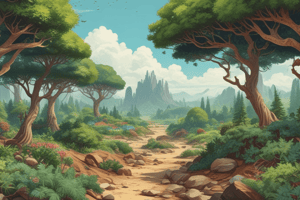Podcast
Questions and Answers
What is a forested biome dominated by cone-bearing evergreen trees?
What is a forested biome dominated by cone-bearing evergreen trees?
Taiga
What biome has moderate winters, long summers, and even rainfall throughout the year with the presence of maple and oaks?
What biome has moderate winters, long summers, and even rainfall throughout the year with the presence of maple and oaks?
Temperate Deciduous Forest
Which biome has a stable, year-long growing season?
Which biome has a stable, year-long growing season?
Tropical Rainforest
What biome receives less than 25 cm of rain per year?
What biome receives less than 25 cm of rain per year?
Which biome is cold and treeless?
Which biome is cold and treeless?
What biome is dominated by shrubs and has hot, dry summers?
What biome is dominated by shrubs and has hot, dry summers?
What biome is also known as a prairie or veldt?
What biome is also known as a prairie or veldt?
Which biome has alternating wet and dry seasons and organisms must withstand periods of drought?
Which biome has alternating wet and dry seasons and organisms must withstand periods of drought?
What biome is characterized by trees that lose all of their leaves in the autumn?
What biome is characterized by trees that lose all of their leaves in the autumn?
What is the largest and northernmost biome?
What is the largest and northernmost biome?
What is considered the most productive of all biomes?
What is considered the most productive of all biomes?
Which biome has rich and fertile soil making it excellent for farming?
Which biome has rich and fertile soil making it excellent for farming?
Which biome has a high risk of fire due to hot and dry summers and the growth of dense, low plants?
Which biome has a high risk of fire due to hot and dry summers and the growth of dense, low plants?
Which biome is characterized by the presence of permafrost?
Which biome is characterized by the presence of permafrost?
What biome has long, cold winters, short mild summers, moderate precipitation, and high humidity?
What biome has long, cold winters, short mild summers, moderate precipitation, and high humidity?
Which biome has plants adapted to reduce water loss, and many animals are nocturnal?
Which biome has plants adapted to reduce water loss, and many animals are nocturnal?
What is considered the most diverse and species-rich habitat?
What is considered the most diverse and species-rich habitat?
Flashcards are hidden until you start studying
Study Notes
Biomes Overview
-
Taiga:
- Forested biome dominated by cone-bearing evergreen trees.
- Features long, cold winters and short, mild summers with moderate precipitation and high humidity.
-
Temperate Deciduous Forest:
- Characterized by moderate winters and long summers.
- Even rainfall throughout the year supports trees like maple and oak.
- Trees lose all leaves in autumn.
-
Tropical Rainforest:
- Has a stable, year-long growing season.
- Known as the most productive of all biomes, rich in biodiversity and species variety.
-
Desert:
- Receives less than 25 cm of rainfall annually.
- Plants possess adaptations to reduce water loss; many animals are nocturnal to cope with heat.
-
Tundra:
- Cold, treeless biome characterized by the presence of permafrost.
- Known as the largest and northernmost biome on Earth.
-
Chaparral:
- Dominated by shrubs, with hot, dry summers that increase the risk of fire.
- Dense, low plants contribute to fire hazards.
-
Temperate Grassland:
- Also referred to as prairie or veldt.
- Rich and fertile soil makes this biome excellent for agriculture; features alternating wet and dry seasons.
-
Savanna:
- Characterized by alternating wet and dry seasons.
- Organisms must adapt to withstand periods of drought.
Key Characteristics by Biome
-
Precipitation:
- Deserts receive very little (less than 25 cm/year), while tropical rainforests have abundant rainfall.
-
Temperature Variance:
- Taiga has cold winters with mild summers; deserts often have extreme temperature fluctuations between day and night.
-
Vegetation Types:
- Taiga: cone-bearing trees; Tundra: little to no trees; Tropical Rainforest: diverse vegetation; Chaparral: shrubs.
-
Soil Fertility:
- Temperate grasslands have rich soil ideal for farming, while deserts typically have poor soil due to low organic matter.
Adaptations and Biodiversity
-
Plant Adaptations:
- Desert plants have features such as reduced leaf surface area to minimize water loss.
-
Animal Adaptations:
- Nocturnal behavior in desert animals helps avoid daytime heat; various species in rainforests have adaptations for high humidity and competition.
-
Ecosystem Diversity:
- Tropical rainforests are the most diverse ecosystems, housing myriad species that play specific roles in the ecosystem.
Studying That Suits You
Use AI to generate personalized quizzes and flashcards to suit your learning preferences.




